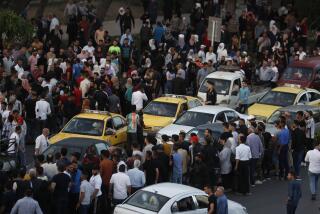Britain, France press for U.N. inquiry on Syria chemical arms use
- Share via
WASHINGTON — The British and French governments have asked the United Nations to investigate what they believe is credible evidence that the Syrian regime has used small amounts of chemical weapons in recent months, officials said Thursday.
The evidence, including soil samples and witness testimony, is not definitive. But the indications are such that “we are pressing the United Nations to investigate further and raising our concerns with international partners,” said a British diplomat who requested anonymity in addressing a sensitive matter.
President Obama has said any use of chemical weapons by Syrian President Bashar Assad’s regime would be a “game changer,” although he hasn’t said how the United States would respond. Other U.S. officials have called it a “red line.”
The Pentagon’s move to send about 200 troops to neighboring Jordan, disclosed Wednesday by Defense Secretary Chuck Hagel, gives the U.S. a military option if it decides one is warranted. The small force can pave the way for a rapid buildup of a much larger contingent.
A U.S. official, speaking on condition of anonymity in discussing intelligence matters, said there was no consensus within the U.S. intelligence community about the possible use of chemical weapons in Syria. “But there are growing concerns that chemical weapons may have been used … in a limited way,” the official said.
Asked about the matter Thursday by members of the Senate Armed Services Committee, James R. Clapper, the director of national intelligence, said he could not discuss it in public.
“The increasingly beleaguered regime, having found that its escalation of violence through conventional means is not working, appears quite willing to use chemical weapons against its own people,” Clapper said.
“We receive many claims of chemical warfare use in Syria each day, and we take them all seriously and we do all we can to investigate them. We can’t provide additional details on these efforts in this setting to protect the fragile critical intelligence we need to assess the situation, but we certainly — we can talk about this in closed session,” Clapper said.
Luxembourg, South Korea and Japan also have asked the United Nations to investigate, diplomats said.
Some diplomats believe that Syria is testing the United States and its partners by using the weapons in small amounts to see what sort of response ensues.
An estimated 70,000 people have died in the Syrian conflict.
The Times of London reported Saturday that soil samples smuggled out of Syria in a British operation showed trace evidence of an unspecified chemical agent.
Last month, after reports of a possible chemical attack, the Syrian government asked the U.N. to investigate whether the rebels had used banned agents.
Syria’s ambassador to the United Nations, Bashar Jaafari, told reporters that he asked Secretary General Ban Ki-moon to form an independent technical mission to investigate the possible use of chemical weapons by the opposition near the city of Aleppo. The Syrian government said 31 people were killed in the attack.
No U.N. officials have been allowed into Syria to investigate, however.
The Syrian Support Group, a Washington advocacy group, accused the Assad regime of firing a Scud missile armed with echothiophate, a chemical agent simulant found in insecticides.
Clapper also said fighters from an Al Qaeda-affiliated group, Al Nusra Front, “are present in 13 of the 14 provinces … and are starting to establish municipal services, provide humanitarian aid: food, hospitals and sharia law courts.”
“That is a great concern,” he said.
Clapper said he did not believe the U.S. had anything to gain by providing arms to the Syrian rebels.
“I believe at this point there are lots and lots of weapons in Syria,” he said. “And if we’re going to expend resources in support of the opposition, I am not convinced now that arming or supplying yet additional weaponry to the opposition will have the desired impact based on cost-benefit.”
Clapper also acknowledged that the war in Syria is destabilizing neighboring Jordan and Lebanon. He said the collapse of the Assad regime would be “a huge strategic loss to Iran,” Syria’s longtime ally.
More to Read
Sign up for Essential California
The most important California stories and recommendations in your inbox every morning.
You may occasionally receive promotional content from the Los Angeles Times.












